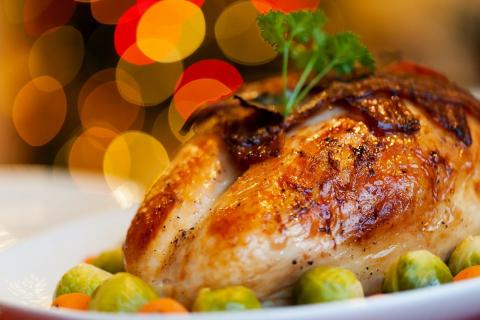Holiday Food Safety

We all enjoy feasting on favorite and festive foods at holiday celebrations. Try following these tips from the Centers for Disease Control and Prevention (CDC) to keep yourself and others safe from food poisoning or foodborne illness during the holidays. It is important that everyone practices food safety during the holidays.
1. Wash your hands.
Be sure to wash your hands with soap and water during times when you are likely to spread germs:
- Before, during and after preparing food
- After touching raw meat, raw eggs or unwashed vegetables
- Before and after caring for someone who is sick
- Before and after treating a cut or wound
- After blowing your nose, coughing, sneezing and using the toilet
- After changing diapers or cleaning a child who has used the toilet
2. Cook food thoroughly. Meat, poultry, seafood and eggs can carry germs that cause food poisoning. Use a food thermometer to ensure these foods have been cooked to safe minimum internal temperature Roasts, chops, steaks and fresh ham should rest for 3 minutes after removing from the oven or grill.
3. Keep food out of the “danger zone.” Bacteria can grow rapidly at room temperature. After food is cooked, keep hot food hot and cold food cold. Refrigerate or freeze any perishable foods within 2 hours. The temperature in your refrigerator should be set at or below 40°F and the freezer at or below 0°F.
4. Use pasteurized eggs for dishes containing raw eggs. Salmonella and other harmful germs can live on both the outside and inside of normal-looking eggs. Many holiday favorites contain raw eggs, such as eggnog, tiramisu, hollandaise sauce and Caesar salad dressing. Always use pasteurized eggs when making these and other foods made with raw eggs.
5. Do not eat dough or batter. Dough and batter made with flour or eggs can contain harmful germs such as E. coli and Salmonella. Do not taste or eat unpasteurized dough or batter of any kind, including batters for cookies, cakes, pies, biscuits, pancakes, tortillas and pizza. Do not let children taste raw dough or batter or play with dough at home or in restaurants.
6. Keep foods separated. Keep meat, poultry, seafood and eggs separate from all other foods at the grocery store and in the refrigerator. Prevent juices from meat, poultry and seafood from dripping or leaking onto other foods by keeping them in containers or sealed plastic bags. Store eggs in their original carton in the main compartment of the refrigerator.
7. Safely thaw your turkey. Thaw turkey in the refrigerator, in a sink of cold water that is changed every 30 minutes or in the microwave. Avoid thawing any foods on the counter. A frozen turkey must thaw at a safe temperature to prevent harmful germs from growing rapidly.
8. According to CDC, pregnant women are 10 times more likely than other adults to get listeriosis, a rare but deadly foodborne infection caused by the bacteria Listeria. Follow these additional food safety tips if preparing food for pregnant women.
- Avoid raw or unpasteurized milk and food products made with it, such as soft cheeses. Raw or unpasteurized milk can contain harmful germs, including Listeria. Avoid drinking raw milk and eating soft cheeses, such as queso fresco, Brie, Camembert, feta, goat cheese or blue-veined cheese, if they are made from raw or unpasteurized milk. Cheeses made from pasteurized milk, such as queso fresco may cause Listeria infections due to contamination during cheese-making.
- Avoid drinking raw or unpasteurized juice and cider.
- Be careful with seafood. Avoid smoked seafood that was sold refrigerated unless it is in a cooked dish, such as a casserole. Choose shelf-stable smoked seafood in pouches or cans that do not need refrigeration.
- Take care with holiday beverages. Drinking any type of alcohol can affect a baby’s growth and development and can cause fetal alcohol spectrum disorders. Pregnant women should not drink holiday punches and eggnogs that contain any alcohol and should avoid eggnog entirely unless it contains no alcohol and is pasteurized or made with pasteurized eggs and milk.
To learn more about food safety go to the US Department of Health and Human Service Food Safety website at https://www.foodsafety.gov/keep-food-safe/4-steps-to-food-safety or contact UNH Extension Education Center.
Do you love learning about stuff like this?
SUBSCRIBE TO Granite State Gardening newsletter
Got questions? The UNH Extension Yard and Garden Infoline offers practical help finding answers for your yard and garden questions.
Call toll free at 1-877-398-4769, Monday to Friday, 9 a.m. to 2 p.m., or fill out webform.
